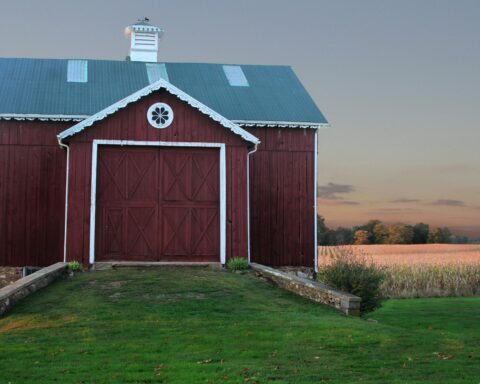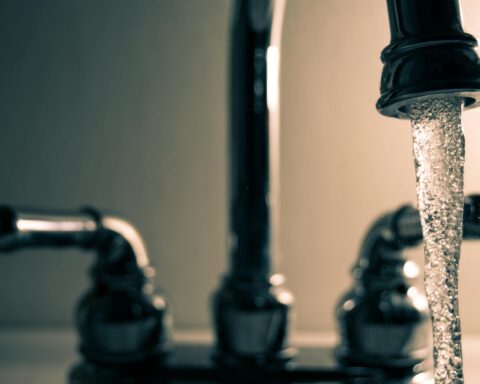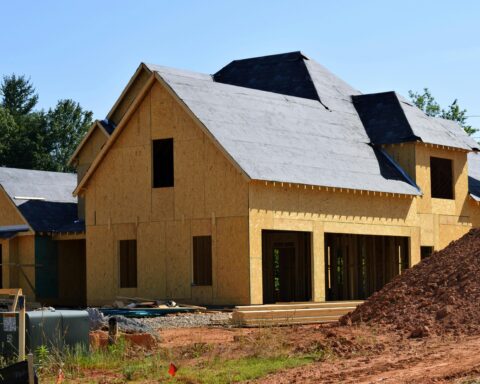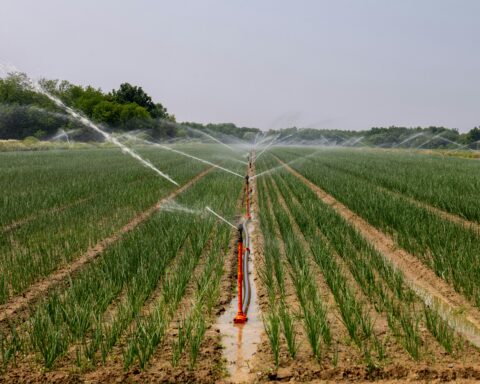How much do state and local governments truly know about their water quality, quantity and usage? And if they knew more, how could they use that information to optimize equity and conservation?
Those are questions a team led by scientists at the University of Kansas is hoping to answer to help their agriculture-heavy state, which has suffered from years of prolonged drought.
KU’s project is one of 15 across the country in which teams comprised of universities, local governments and private companies are participating in a federally backed program to improve freshwater systems in the U.S. and beyond.
Good monitoring data is necessary for understanding water quality, quantity and usage and how it affects sustainability, and that’s what KU is hoping to improve with its project – “Improving Water Quality and Equity through Sensor Data and Machine Learning Models.”
The project will develop a water management data ecosystem that collects that key data, models it with machine learning algorithms, and makes insights available for local government officials and state government agencies, KU said.
What scientists are exploring
Over the first year of the project, the KU team plans to create a data dashboard for real-time public reporting on water quantity, water quality and water equity.
“While one can view water equity in several ways, our project explores how the water-related actions of one group of Kansas community members undermine the ability of another group to use water in Kansas,” said Dietrich Earnhart, director of the Center for Environmental Policy and professor of economics at KU. “The dashboard that our project is developing will help to mitigate this problematic interaction, thus improving water equity.”

KU mechanical engineering students will design a sensor that will remotely detect the existence of harmful algal blooms and broadcast the data to the network.
Students in the Kansas Data Science Consortium Community Data Labs course will work to build the dashboard and collect water data from the many different sources available, including the Kansas Geological Survey.
Improving equitable access to water
The KU team is working with a $650,000 grant from the U.S. National Science Foundation (NSF) Convergence Accelerator. The team includes representatives of tech company Viaanix and officials from the Kansas Water Office.
The NSF Convergence Accelerator project — Track K: Equitable Water Solutions — builds on previous NSF research and workshops that showed a pressing need to create technology to help ensure safe water access amid rising temperatures, pollution and drought.
The NSF is investing $9.8 million in 15 studies that were selected for Track K’s first phase.
In 2022, 2.2 billion people lacked safe drinking water; 3.5 billion people lacked safe sanitation; and 2 billion people lacked a basic handwashing facility, according to the National Institutes of Health.
It is estimated that billions of people will lack access to these basic services by 2030, unless viable and proactive solutions are developed, the NSF said.
“Ensuring safe and equitable water resources while incorporating environmentally sustainable practices is imperative to our future,” said Erwin Gianchandani, NSF assistant director for Technology, Innovation and Partnerships (TIP). “Through programs like the Convergence Accelerator, NSF is harnessing the nation’s diverse talent to stimulate innovation, technologies and solutions to address fit-for-purpose needs across the nation.”
Over the next nine months, each team will develop their initial idea into a proof of concept, identify new team members and partners, and participate in the NSF Convergence Accelerator’s Phase 1 innovation curriculum. The curriculum includes providing fundamentals in human-centered design; team science; use-inspired research; early-stage prototyping; and communications, storytelling and pitching.
At the end of Phase 1, the teams will participate in a formal proposal and pitch to demonstrate the feasibility of their solutions and apply for Phase 2.
“Because water needs are complex, there isn’t a one-size-fits-all solution,” said Douglas Maughan, head of the NSF Convergence Accelerator program.” This topic is perfect for convergence — bringing multiple disciplines, expertises and sectors together — to solve large-scale challenges. We’re excited to launch this track and to see how the 15 teams will engage and partner with communities, end-users and stakeholders to develop real-world sustainable solutions.”
Other projects include:
- Advancing Equitable and Circular Water Solutions Through Source Separation, led by the Regents of the University of Michigan.
- AI Copilot for Rural Water Quality, led by Delta Bravo Artificial Intelligence, Inc.
- COMPASS: Comprehensive Prediction, Assessment, and Equitable Solutions for Storm-Induced Contamination of Freshwater Systems, led by the University of South Carolina.
- Equity in Water Information for Community Capacity Building, led by Boise State University.
- Electrokinetic Water Purification System for Point-of-Use Applications, led by Iowa State University.
- Living Matter, Artificial Intelligence, and Water Nascency (LAWN) for Regenerative Environments and Equity, led by the University of California, Berkeley.
- Mapping the Nation’s Wetlands for Equitable Water Quality, Monitoring, Conservation, and Policy Development, led by University of Washington.
- Measuring and Mitigating Land Management Impacts on In-Stream Water Quality with Sensor-Informed Data Fusion and Community-Led, Climate Financed Riparian Restoration, led by SweetSense, Inc.
- Passive Samplers for Equitable Monitoring of Drinking Water Quality, led by led by Washington University in Saint Louis.
- Prototyping Decision Support and Monitoring Tools for Equitable Management of Salt Contamination of Water Supplies in Tidal Rivers, led by the University of Maryland Center for Environmental Sciences.
- Remote Sensing Tools for Catalyzing Equitable Water Outcomes, led by the University of Pittsburgh.
- Towards Resilient, Equitable, Safe and Sustainable Water for Islands (RESSI-H2O), led by the University of South Florida.
- Unraveling the Benefits, Costs, and Equity of Tree Coverage in Desert Cities, led by the University of Texas, El Paso.
- Water for Small And Very Small Systems (WaterSAVerS) – A Convergence Framework for Expediting Equitable Water Systems Deployment, led by Cornell University.
All news and information on this site is provided by the team at Strategic Partnerships, Inc. Check out this short 1-minute video that provides a quick overview of how we work with clients.
Photo courtesy of the University of Kansas














